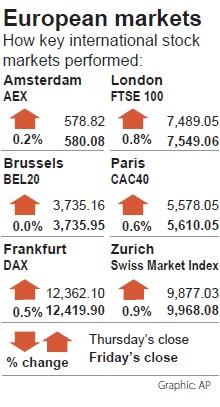Large-cap companies on Friday pulled European stocks higher as a surge in the UK’s Vodafone Group PLC and strong earnings for media businesses and Nestle SA spurred recovery from a sell-off driven by the European Central Bank (ECB).
The pan-European benchmark index rose 0.3 percent, bouncing back from its worst session in three weeks.
London’s FTSE 100 outperformed European peers with a 0.8 percent advance, helped by telecoms companies.

Vodafone gained 10.6 percent to record it strongest performance since late 2002 on plans to separate its towers unit in Europe into a new company worth upwards of 18 billion euros (US$20 billion) with a view to a potential stock market listing.
The STOXX 600 telecoms index rose 2.3 percent as shares of Cellnex Telecom SA, Europe’s biggest towers group, gained 3.3 percent and Telecom Italia SpA rose 4.1 percent after Vodafone agreed to jointly roll out 5G in Italy and merge their mobile mast operations.
However, media stocks led the gains after upbeat results from France’s Vivendi SA, satellite operator SES and education company Pearson Education.
Another blue-chip stock to perform well was Nestle, which rose nearly 2 percent after posting its fastest quarterly sales growth in three years.
“There has been a more positive set of corporate earnings since yesterday’s close and chiefly Vodafone,” City Index Group analyst Ken Odeluga said.
European shares took a beating on Thursday after ECB President Mario Draghi all but pledged to ease monetary policy further and even hinted at a reinterpretation of the bank’s inflation target, but disappointed some investors who had hoped for an immediate cut to interest rates.
Despite Thursday’s blip, the main STOXX index posted a 0.8 percent gain on the week, driven partly by hopes of policy easing from the ECB as economic data point to a worsening outlook for Europe’s already slowing economy.
“There is a bit of reassessment and the market has attracted some buyers back due to the big selling yesterday,” Odeluga said.
“We also had the US GDP [data], which was not as bad as expected and allows investors to go into the weekend with a bit more positive sentiment,” he said.
US data showed that economic growth slowed less than expected in the second quarter, although it did little to deter expectations that the US Federal Reserve will cut interest rates by 25 basis points next week.
Among the weak spots, Banco Sabadell SA and CaixaBank SA fell more than 6.5 percent.
Luxury stock Kering SA slumped 7 percent as its main Gucci brand reported a slower-than-expected rise in second-quarter sales, hit by a blip in the US.

Intel Corp chief executive officer Lip-Bu Tan (陳立武) is expected to meet with Taiwanese suppliers next month in conjunction with the opening of the Computex Taipei trade show, supply chain sources said on Monday. The visit, the first for Tan to Taiwan since assuming his new post last month, would be aimed at enhancing Intel’s ties with suppliers in Taiwan as he attempts to help turn around the struggling US chipmaker, the sources said. Tan is to hold a banquet to celebrate Intel’s 40-year presence in Taiwan before Computex opens on May 20 and invite dozens of Taiwanese suppliers to exchange views

Application-specific integrated circuit designer Faraday Technology Corp (智原) yesterday said that although revenue this quarter would decline 30 percent from last quarter, it retained its full-year forecast of revenue growth of 100 percent. The company attributed the quarterly drop to a slowdown in customers’ production of chips using Faraday’s advanced packaging technology. The company is still confident about its revenue growth this year, given its strong “design-win” — or the projects it won to help customers design their chips, Faraday president Steve Wang (王國雍) told an online earnings conference. “The design-win this year is better than we expected. We believe we will win

Chizuko Kimura has become the first female sushi chef in the world to win a Michelin star, fulfilling a promise she made to her dying husband to continue his legacy. The 54-year-old Japanese chef regained the Michelin star her late husband, Shunei Kimura, won three years ago for their Sushi Shunei restaurant in Paris. For Shunei Kimura, the star was a dream come true. However, the joy was short-lived. He died from cancer just three months later in June 2022. He was 65. The following year, the restaurant in the heart of Montmartre lost its star rating. Chizuko Kimura insisted that the new star is still down

While China’s leaders use their economic and political might to fight US President Donald Trump’s trade war “to the end,” its army of social media soldiers are embarking on a more humorous campaign online. Trump’s tariff blitz has seen Washington and Beijing impose eye-watering duties on imports from the other, fanning a standoff between the economic superpowers that has sparked global recession fears and sent markets into a tailspin. Trump says his policy is a response to years of being “ripped off” by other countries and aims to bring manufacturing to the US, forcing companies to employ US workers. However, China’s online warriors